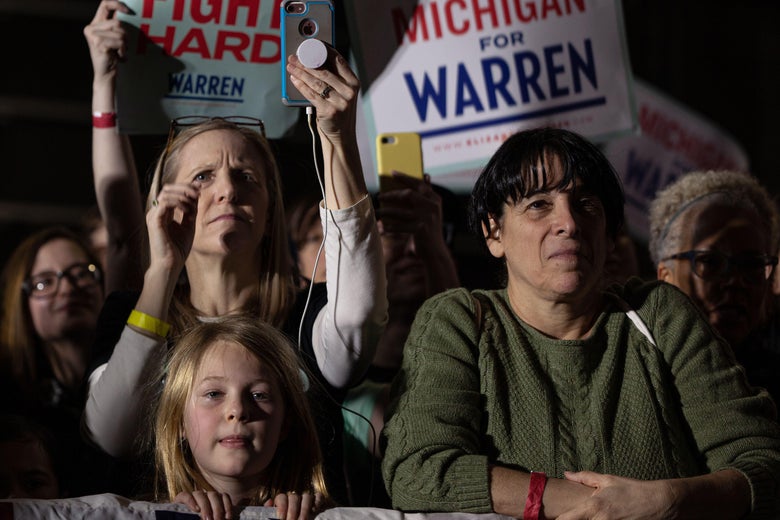
Warren supporters in Detroit on Super Tuesday.
SETH HERALD/Getty Images
Heidi Li Feldman’s experience as a supporter of Hillary Clinton in the 2008 primary prepared her, in some way, for 2020. In 2008, she believed Clinton was uniquely well-equipped for the job, but she also saw “a tremendous amount of fear and hatred” directed at both Clinton and her female supporters—in part coming from other Democrats who supported Barack Obama. “All my life I have witnessed the large and small ways in which women are systematically and individually subordinated in any context where any power is at stake,” she said this week. “If you were an involved supporter of Clinton’s run in 2008, you lived those dynamics. You couldn’t come out of that experience naive about the potential for a woman to become president of the United States.”
Feldman, a law professor at the Georgetown University Law Center, was more than an “involved supporter” of Clinton in 2008. She co-founded a nonprofit that pushed for the DNC to open the Democratic convention to a roll call vote and speeches on behalf of Clinton. Anything less, the group warned, would be a “coronation” of Obama. Feldman’s group was part of the larger “PUMA” movement—“party unity my ass”—a cohort that BuzzFeed later referred to as “Hillary Clinton’s dead-enders.” Feldman eventually moved on, and she supported Clinton again in 2016. This cycle, she supported Elizabeth Warren. “I’m not depressed about it, I’m annoyed,” she said the morning after Super Tuesday. “I think a lot of women who are 40, 50, 60 years old are incredibly fed up.”
“I think a lot of women who are 40, 50, 60 years old are incredibly fed up.” — Warren supporter Heidi Li Feldman
As the Democratic field has narrowed rapidly over the last several weeks, plenty of voters are disappointed that their candidate didn’t make it to the end. But there’s a special kind of defeat experienced by women who supported Hillary Clinton through multiple election cycles, and supported Elizabeth Warren through this one. Most of these women say they’ll vote in November for any Democratic candidate against Donald Trump. But many of them haven’t forgotten how Bernie Sanders delayed his endorsement of Hillary in 2016. They’re exhausted by the aggressiveness of some of his supporters. They’re uninspired by Biden. “I thought we’d moved on from having two men basically cockfighting on the debate stage,” Warren supporter Sayu Bhojwani said.
The day after Super Tuesday, Kim Haas was experiencing “a mixture of disappointment and relief.” She was sad that her candidate, Warren, had performed so poorly. She also felt a particular antipathy toward Bernie and his supporters, though, so was gratified at the possibility that Biden could slow him down. “But it’s not optimal. It’s like: I waited four years for this?” Haas sees Sanders’ focus on “revolution” as unrealistic, and she compared his supporters to Trump fans: “They both have the tendency to follow people without question.” Haas, who was also active in the PUMA movement—she operates a pro-Clinton blog under the pen name Riverdaughter—said she will write in Warren’s name on her ballot.
"I thought we’d moved on from having two men basically cockfighting on the debate stage." — Warren supporter Sayu Bhojwan
Serene Arena, who lives in Chicago, agrees with Sanders on almost every policy issue—on paper. She reads the socialist magazine Jacobin and considers herself a social democrat, a term she said describes Sanders, too. But she viewed Elizabeth Warren as much more likely to get things done, and she is exhausted by the “endemic sexism” that she sees holding her candidate back. “I see [Sanders] as a perpetuation of that,” she said. “I don’t see where he is really lifting women up so much as letting the women who believe in him come with him.” In January, Warren accused Sanders of having told her in 2018 that he did not think a woman could win the presidency. (Sanders denied her account.)
Bhojwani, who supported Clinton in the 2016 primary, acknowledges Sanders’s activism in the Civil Rights movement, but sees his recent record on racial and gender issues as thin, and is unimpressed by his apparent lack of interest in getting up to speed. (Bhojwani emphasized that her support of any candidate does not represent her organization.) She described Warren, by contrast, as a “fast learner” on issues like black maternal health with a strong record of legislative achievement.
“When you look at someone like Sanders, the way he behaves onstage, his mannerisms and his way of speaking, his single-mindedness, his very limited track record of getting anything done—a woman would have been torn apart,” Bhojwani said. As for Biden: “Imagine a woman who had lost every state in every presidential primary, running for the third time.”
Readers like you make our work possible. Help us continue to provide the reporting, commentary and criticism you won’t find anywhere else.
Join Slate Plusfrom Slate Magazine https://ift.tt/2Ip8JZj
via IFTTT
沒有留言:
張貼留言